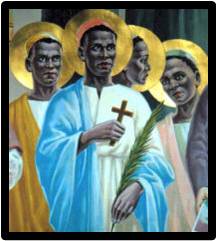JUNE 3 - ST. CHARLES LWANGA AND COMPANIONS

Christianity was still quite new to Uganda, Africa, when a Catholic mission was started in 1879. The priests were members of the Missionaries of Africa. Because of their white religious habit, they became popularly known as the “White Fathers.”
King Mwanga did not know what Christianity was all about. But he became angry when a Catholic, Joseph Mkasa, corrected him for the way he was living. The king had murdered a group of Christians and their Anglican bishop.
The king was also involved in homosexual activity. He was especially interested in his court pages. King Mwanga’s anger turned into resentment and hatred for Joseph Mkasa and his religion. A few of the king’s ambitious officers fueled his fears with lies.
Joseph Mkasa was beheaded on November 18, 1885. The persecution had begun. Before it was over, a hundred people died. Twenty-two of them would be declared saints. With the death of Joseph Mkasa, Charles Lwanga became the chief religion teacher of the king’s Catholic pages.
King Mwanga’s face twisted in rage “It can’t be true.” He yelled at his adviser. “It is true, Charles Lwanga, your steward, has baptized four more catechumens, all men under the age of twenty-five.” “Don’t they fear to die like their friend Joseph Mkasa, who was killed for his disobedience?” “That’s the strange thing,” answered the adviser, “they’ve held even more strongly to their faith after his death. More houng men are attracted to Christianity than ever.”
The king called in Denis Sebuggwawo. He asked Denis if he had been teaching religion to another page. Denis said yes. The king grabbed his spear and flung it violently through the young man’s throat. Then the king shouted that no one was permitted to leave his headquarters.
War drums beat throughout the night calling the executioners. In a hidden room, Charles Lwanga secretly baptized four pages. One was St. Kizito, a cheerful, generous thirteen-year-old. He was the youngest of the group. St. Charles Lwanga had often protected Kizito from the king’s lust.
Most of the twenty-two Uganda martyrs who have been proclaimed saints were killed on June 3, 1886. They were forced to walk thirty-seven miles to the execution site. After a few days in prison, they were thrown into a huge fire and burned alive. What the king did not realize was that the blood of the martyrs is the seed of the Church.
Seventeen of the martyrs were royal pages. One of the martyred boys was St. Mbaga. His own father was the executioner that day. Another of the martyrs, St. Andrew Kagwa, died on January 27, 1887. He was among the twenty-two proclaimed saints in 1964 by Pope Paul VI.
